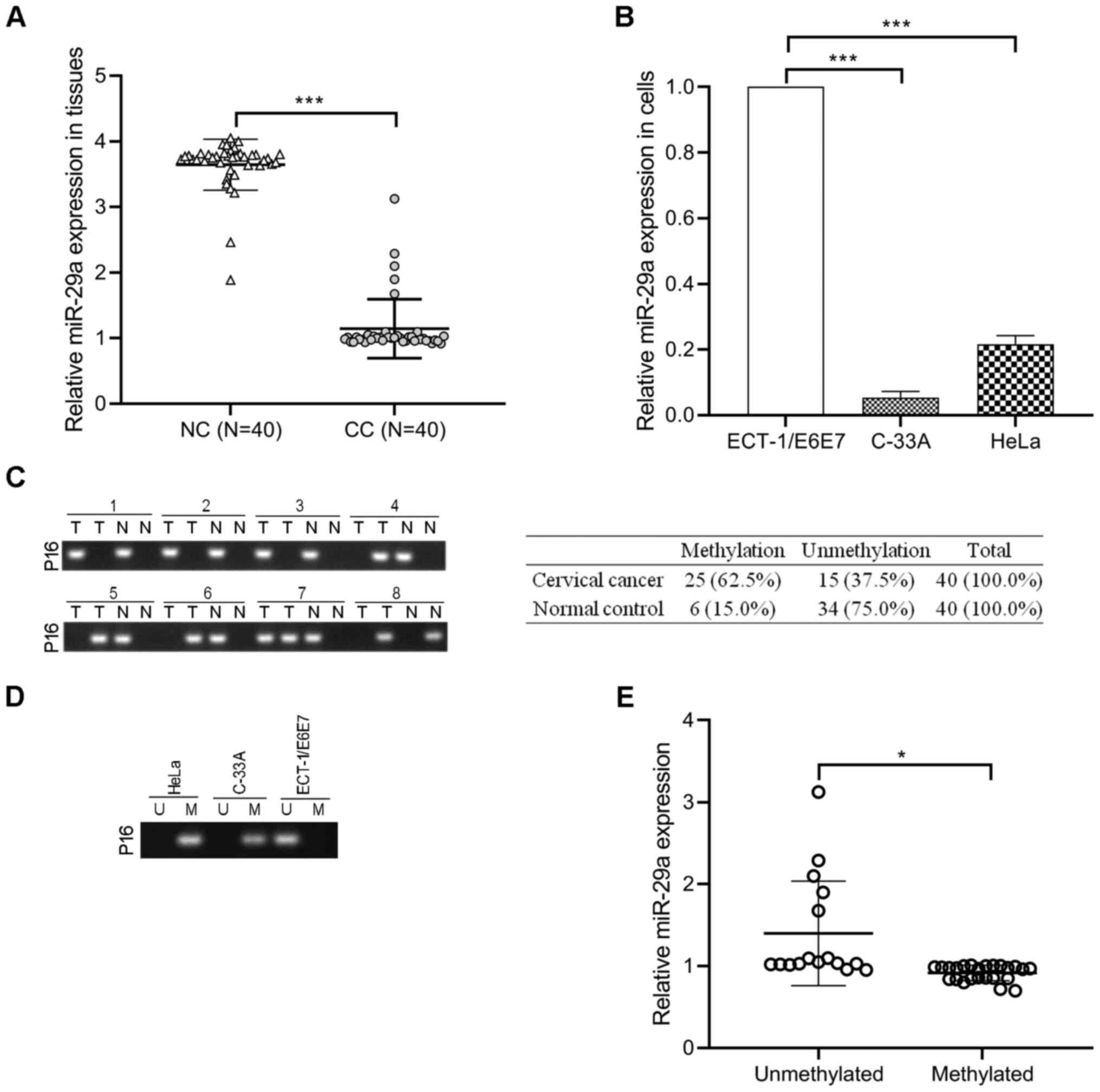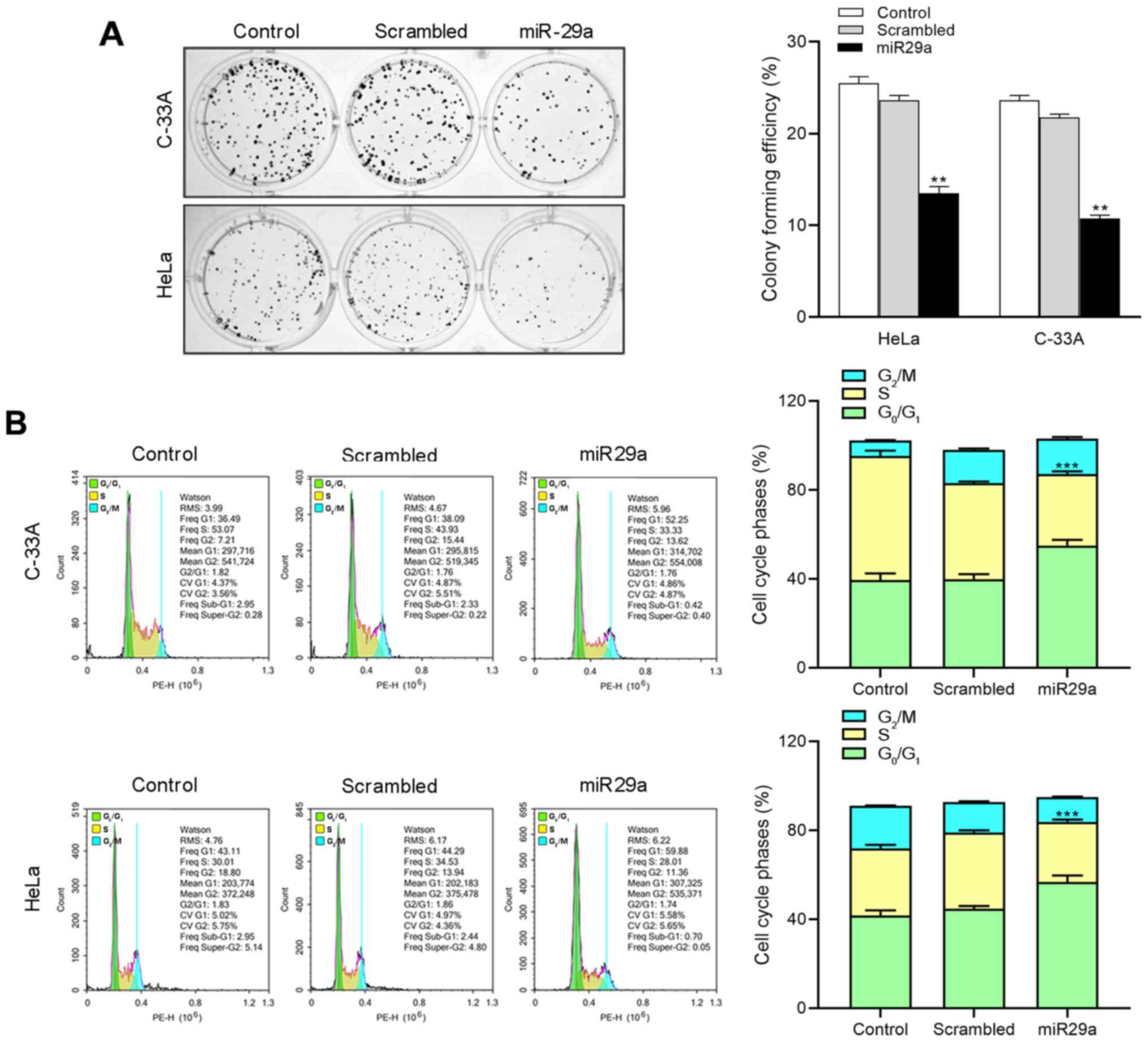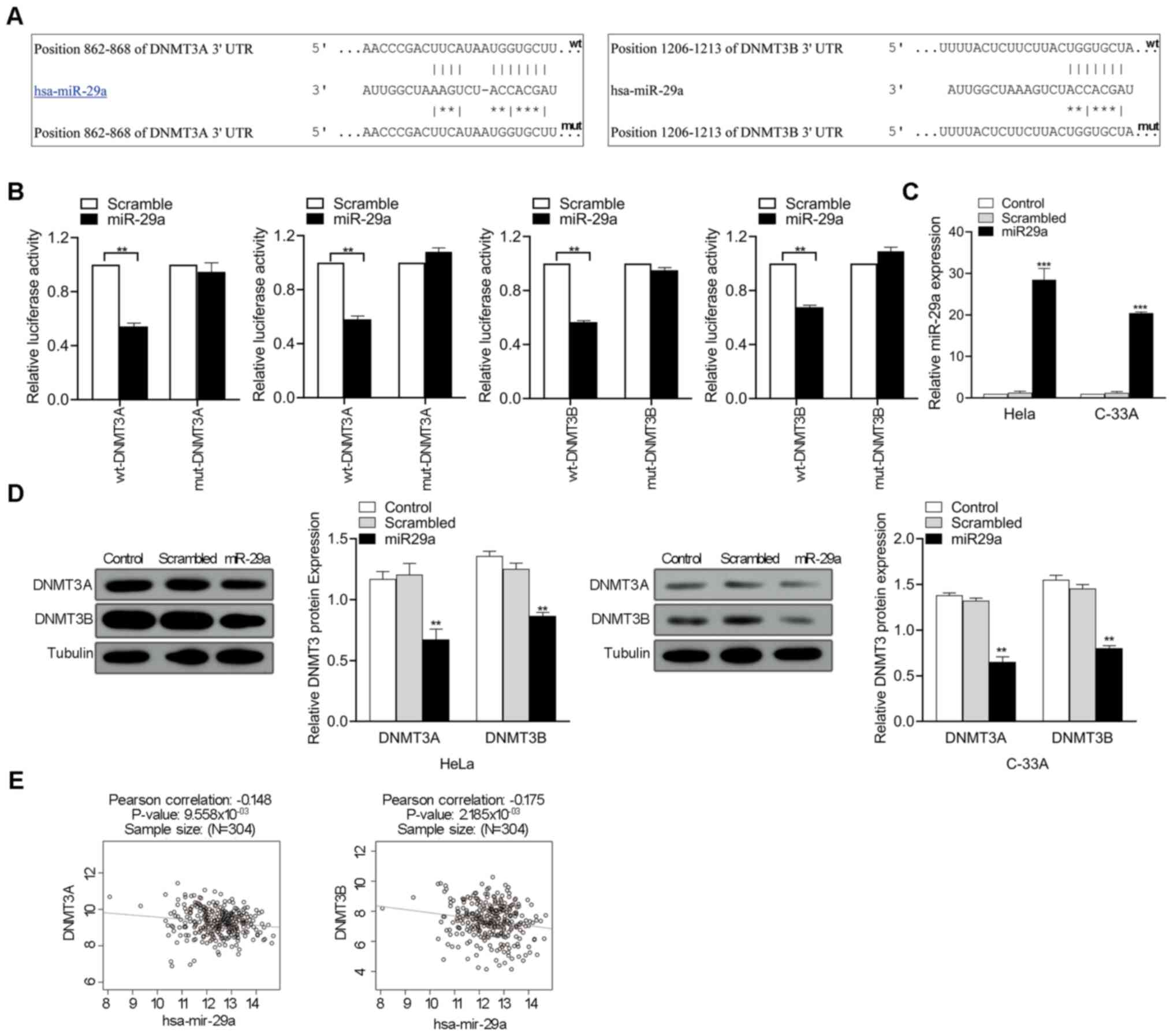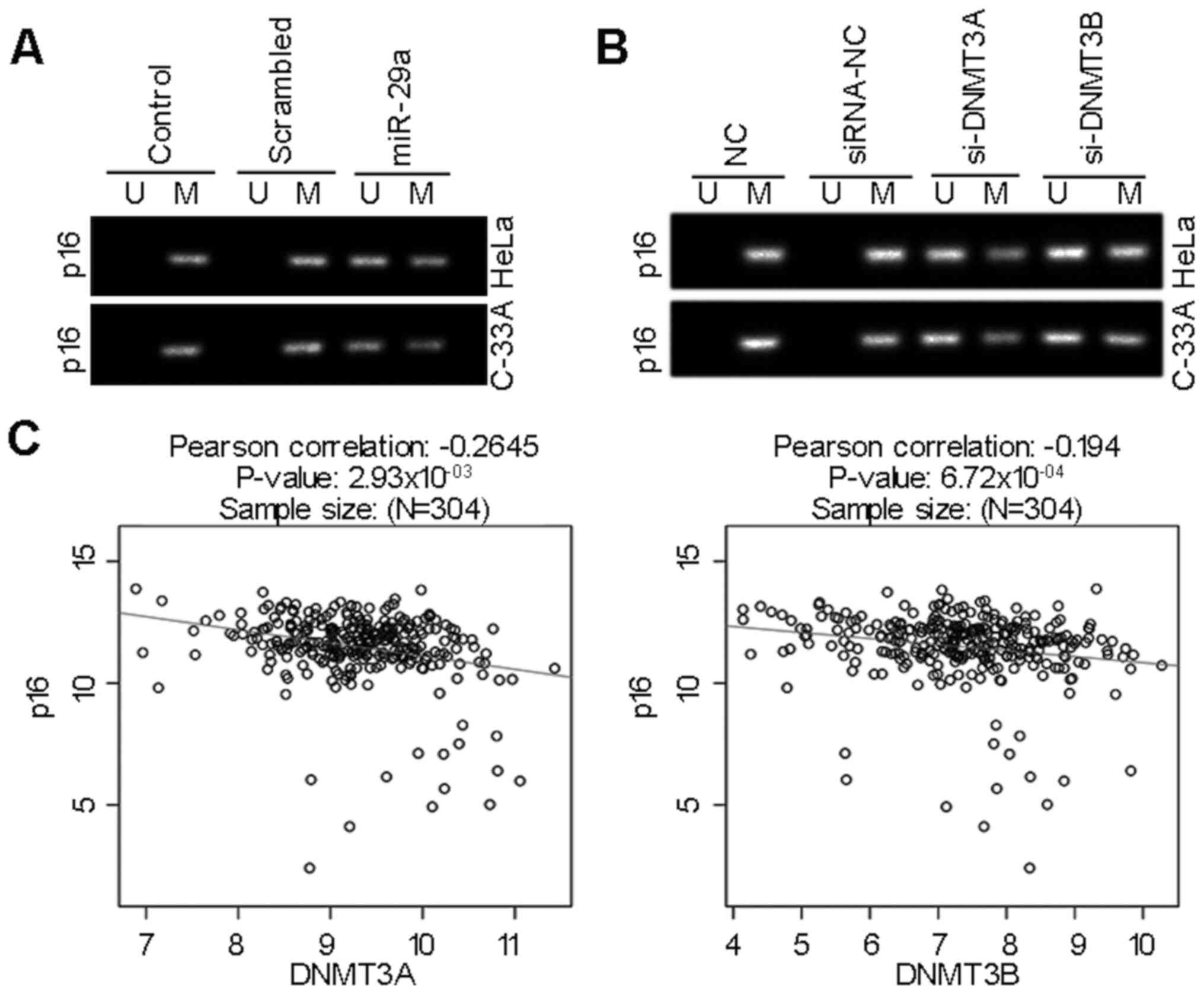|
1
|
Freddie B, Ferlay J, Soerjomataram I,
Siegel RL, Torre LA and Jemal A: Global cancer statistics 2018:
GLOBOCAN estimates of incidence and mortality worldwide for 36
cancers in 185 countries. CA Cancer J Clin. 68:394–424. 2018.
View Article : Google Scholar : PubMed/NCBI
|
|
2
|
Razavi ZS, Tajiknia V, Majidi S, Ghandali
M, Mirzaei HR, Rahimian N, Hamblin MR and Mirzaei H: Gynecologic
cancers and non-coding RNAs: Epigenetic regulators with emerging
roles. Crit Rev Oncol Hematol. 157:1031922020. View Article : Google Scholar : PubMed/NCBI
|
|
3
|
Burd EM: Human papillomavirus and cervical
cancer. Clin Microbiol Rev. 16:1–17. 2003. View Article : Google Scholar : PubMed/NCBI
|
|
4
|
Menezo Y, Clement P, Clement A and Elder
K: Methylation: An ineluctable biochemical and physiological
process essential to the transmission of life. Int J Mol Sci.
21:93112020. View Article : Google Scholar
|
|
5
|
Zhu H, Zhu H, Tian M, Wang D, He J and Xu
T: DNA methylation and hydroxymethylation in cervical cancer:
Diagnosis, prognosis and treatment. Front Genet. 9:3472020.
View Article : Google Scholar
|
|
6
|
Urbano A, Smith J, Weeks RJ and Chatterjee
A: Gene-Specific targeting of DNA methylation in the mammalian
genome. Cancers (Basel). 11:15152019. View Article : Google Scholar
|
|
7
|
Jiao Y, Feng Y and Wang X: Regulation of
tumor suppressor gene CDKN2A and Encoded p16-INK4a protein by
covalent modifications. Biochemistry (Mosc). 83:1289–1298. 2018.
View Article : Google Scholar : PubMed/NCBI
|
|
8
|
Wang FL, Yang Y, Liu ZY, Qin Y and Jin T:
Correlation between methylation of the p16 promoter and cervical
cancer incidence. Eur Rev Med Pharmacol Sci. 21:2351–2356.
2017.PubMed/NCBI
|
|
9
|
O'Neill CJ and McCluggage WG: p16
expression in the female genital tract and its value in diagnosis.
Adv Anat Pathol. 13:8–15. 2006. View Article : Google Scholar : PubMed/NCBI
|
|
10
|
Han YD, Wang XB, Cui NH, Zhang S, Wang C
and Zheng F: Associations of P16INK4a promoter hypermethylation
with squamous intra-epithelial lesion, cervical cancer and their
clinicopathological features: A meta-analysis. Oncotarget.
8:1871–1883. 2017. View Article : Google Scholar : PubMed/NCBI
|
|
11
|
Kohler F and Rodríguez-Paredes M: DNA
methylation in epidermal differentiation, aging, and cancer. J
Invest Dermatol. 140:38–47. 2020. View Article : Google Scholar : PubMed/NCBI
|
|
12
|
Gujar H, Weisenberger DJ and Liang G: The
roles of human DNA methyltransferases and their isoforms in shaping
the epigenome. Genes (Basel). 10:1722019. View Article : Google Scholar
|
|
13
|
Hassouna MM, Naguib M, Radwan EM,
Abdel-Samiee M, Estaphan S and Abdelsameea E: DNA
methyltransferases as potential biomarkers for HCV related
hepatocellular carcinoma. Asian Pac J Cancer Prev. 1:3357–3363.
2020. View Article : Google Scholar
|
|
14
|
Zhu A, Hopkins KM, Friedman RA, Bernstock
JD, Broustas CG and Lieberman HB: DNMT1 and DNMT3B regulate
tumorigenicity of human prostate cancer cells by controlling RAD9
expression through targeted methylation. Carcinogenesis.
11:bgaa0882020. View Article : Google Scholar
|
|
15
|
Cervena K, Siskova A, Buchler T, Vodicka P
and Vymetalkova V: Methylation-based therapies for colorectal
cancer. Cells. 24:15402020. View Article : Google Scholar
|
|
16
|
Liu H, Song Y, Qiu H, Liu Y, Luo K, Yi Y,
Jiang G, Lu M, Zhang Z, Yin J, et al: Downregulation of FOXO3a by
DNMT1 promotes breast cancer stem cell properties and
tumorigenesis. Cell Death Differ. 27:966–983. 2020. View Article : Google Scholar : PubMed/NCBI
|
|
17
|
Piyathilake CJ, Badiga S, Borak SG,
Weragoda J, Bae S, Matthews R, Bell WC and Partridge EE: A higher
degree of expression of DNA methyl transferase 1 in cervical cancer
is associated with poor survival outcome. Int J Womens Health.
9:413–420. 2017. View Article : Google Scholar : PubMed/NCBI
|
|
18
|
Sundaram MK, Hussain A, Haque S, Raina R
and Afroze N: Quercetin modifies 5′CpG promoter methylation and
reactivates various tumor suppressor genes by modulating epigenetic
marks in human cervical cancer cells. J Cell Biochem.
120:18357–18369. 2019. View Article : Google Scholar : PubMed/NCBI
|
|
19
|
Sundaram MK, Ansari MZ, Al Mutery A,
Ashraf M, Nasab R, Rai S, Rais N and Hussain A: Genistein induces
alterations of epigenetic modulatory signatures in human cervical
cancer cells. Anticancer Agents Med Chem. 18:412–421. 2018.
View Article : Google Scholar : PubMed/NCBI
|
|
20
|
Khan MA, Sundaram MK, Hamza A, Quraishi U,
Gunasekera D, Ramesh L, Goala P, Al Alami U, Ansari MZ, Rizvi TA,
et al: Sulforaphane reverses the expression of various tumor
suppressor genes by targeting DNMT3B and HDAC1 in human cervical
cancer cells. Evid Based Complement Alternat Med.
2015:4121492015.PubMed/NCBI
|
|
21
|
Lu TX and Rothenberg ME: MicroRNA. J
Allergy Clin Immunol. 141:1202–1207. 2018. View Article : Google Scholar : PubMed/NCBI
|
|
22
|
Kabekkodu SP, Shukla V, Varghese VK,
D'Souza J, Chakrabarty S and Satyamoorthy K: Clustered miRNAs and
their role in biological functions and diseases. Biol Rev Camb
Philos Soc. 93:1955–1986. 2018. View Article : Google Scholar : PubMed/NCBI
|
|
23
|
Condrat CE, Thompson DC, Barbu MG, Bugnar
OL, Boboc A, Cretoiu D, Suciu N, Cretoiu SM and Voinea SC: miRNAs
as biomarkers in disease: Latest findings regarding their role in
diagnosis and prognosis. Cells. 9:2762020. View Article : Google Scholar
|
|
24
|
Yang Y, Dodbele S, Park T, Glass R, Bhat
K, Sulman EP, Zhang Y and Abounader R: MicroRNA-29a inhibits
glioblastoma stem cells and tumor growth by regulating the PDGF
pathway. J Neurooncol. 145:23–34. 2019. View Article : Google Scholar : PubMed/NCBI
|
|
25
|
Liu YB, Wang Y, Zhang MD, Yue W and Sun
CN: MicroRNA-29a functions as a tumor suppressor through targeting
STAT3 in laryngeal squamous cell carcinoma. Exp Mol Pathol.
116:1045212020. View Article : Google Scholar : PubMed/NCBI
|
|
26
|
Gong HL, Tao Y, Mao XZ, Song DY, You D and
Ni JD: MicroRNA-29a suppresses the invasion and migration of
osteosarcoma cells by regulating the SOCS1/NF-κB signalling pathway
through negatively targeting DNMT3B. Int J Mol Med. 44:1219–1232.
2019.PubMed/NCBI
|
|
27
|
Nan P, Niu Y, Wang X and Li Q: miR-29a
function as tumor suppressor in cervical cancer by targeting SIRT1
and predict patient prognosis. Onco Targets Ther. 26:6917–6925.
2019. View Article : Google Scholar
|
|
28
|
Zhang Y, Yang L, Wang S, Liu Z and Xiu M:
miR-29a suppresses cell proliferation by targeting SIRT1 in
hepatocellular carcinoma. Cancer Biomark. 22:151–159. 2018.
View Article : Google Scholar : PubMed/NCBI
|
|
29
|
Liu ZJ, Chen SG, Yang YZ, Lu SJ, Zhao XM,
Hu B and Zhang L: miR-29a inhibits adhesion, migration, and
invasion of osteosarcoma cells by suppressing CDC42. Int J Clin Exp
Pathol. 12:4171–4180. 2019.PubMed/NCBI
|
|
30
|
Chen R and Zhang L: miR-29a inhibits cell
proliferation and migration by targeting the CDC42/PAK1 signaling
pathway in cervical cancer. Anticancer Drugs. 30:579–587. 2019.
View Article : Google Scholar : PubMed/NCBI
|
|
31
|
Shi C, Ren L, Sun C, Yu L, Bian X, Zhou X,
Wen Y, Hua D, Zhao S, Luo W, et al: miR-29a/b/c function as
invasion suppressors for gliomas by targeting CDC42 and predict the
prognosis of patients. Br J Cancer. 117:1036–1047. 2017. View Article : Google Scholar : PubMed/NCBI
|
|
32
|
Zhang M, Guo W, Qian J and Wang B:
Negative regulation of CDC42 expression and cell cycle progression
by miR-29a in breast cancer. Open Med (Wars). 11:78–82. 2016.
View Article : Google Scholar : PubMed/NCBI
|
|
33
|
Yamamoto N, Kinoshita T, Nohata N, Yoshino
H, Itesako T, Fujimura L, Mitsuhashi A, Usui H, Enokida H, Nakagawa
M, et al: Tumor-suppressive microRNA-29a inhibits cancer cell
migration and invasion via targeting HSP47 in cervical squamous
cell carcinoma. Int J Oncol. 43:1855–1863. 2013. View Article : Google Scholar : PubMed/NCBI
|
|
34
|
Bibaki E, Tsitoura E, Vasarmidi E,
Margaritopoulos G, Trachalaki A, Koutoulaki C, Georgopoulou T,
Spandidos DA, Tzanakis N and Antoniou KM: miR-185 and miR-29a are
similarly expressed in the bronchoalveolar lavage cells in IPF and
lung cancer but common targets DNMT1 and COL1A1 show disease
specific patterns. Mol Med Rep. 17:7105–7112. 2018.PubMed/NCBI
|
|
35
|
Kogure T, Kondo Y, Kakazu E, Ninomiya M,
Kimura O and Shimosegawa T: Involvement of miRNA-29a in epigenetic
regulation of transforming growth factor-beta-induced
epithelial-mesenchymal transition in hepatocellular carcinoma.
Hepatol Res. 44:907–919. 2014. View Article : Google Scholar : PubMed/NCBI
|
|
36
|
Cicchini C, de Nonno V, Battistelli C,
Cozzolino AM, De Santis Puzzonia M, Ciafrè SA, Brocker C, Gonzalez
FJ, Amicone L and Tripodi M: Epigenetic control of EMT/MET
dynamics: HNF4α impacts DNMT3s through miRs-29. Biochim Biophys
Acta. 1849:919–929. 2015. View Article : Google Scholar : PubMed/NCBI
|
|
37
|
Robaina MC, Mazzoccoli L, Arruda VO, de
Souza Reis FD, Apa AG, de Rezende LM and Klumb CE: Deregulation of
DNMT1, DNMT3B and miR-29s in burkitt lymphoma suggests novel
contribution for disease pathogenesis. Exp Mol Pathol. 98:200–207.
2015. View Article : Google Scholar : PubMed/NCBI
|
|
38
|
Oliveira LH, Schiavinato JL, Fráguas MS,
Lucena-Araujo AR, Haddad R, Araújo AG, Dalmazzo LF, Rego EM, Covas
DT, Zago MA and Panepucci RA: Potential roles of microRNA-29a in
the molecular pathophysiology of T-cell acute lymphoblastic
leukemia. Cancer Sci. 106:1264–1277. 2015. View Article : Google Scholar : PubMed/NCBI
|
|
39
|
Zhou X, Zhao F, Wang ZN, Song YX, Chang H,
Chiang Y and Xu HM: Altered expression of miR-152 and miR-148a in
ovarian cancer is related to cell proliferation. Oncol Rep.
27:447–454. 2012.PubMed/NCBI
|
|
40
|
Vasaikar SV, Straub P, Wang J and Zhang B:
LinkedOmics: Analyzing multi-omics data within and across 32 cancer
types. Nucleic Acids Res. 46:D956–D963. 2018. View Article : Google Scholar : PubMed/NCBI
|
|
41
|
Gao L, Anteneh H and Song J: Dissect the
DNMT3A- and DNMT3B-mediated DNA Co-methylation through a covalent
complex approach. J Mol Biol. 17:569–575. 2020. View Article : Google Scholar
|
|
42
|
Di Leva G, Garofalo M and Croce CM:
MicroRNAs in cancer. Annu Rev Pathol. 9:287–314. 2014. View Article : Google Scholar : PubMed/NCBI
|
|
43
|
Chen X, Li M, Zhou H and Zhang L: miR-132
Targets FOXA1 and exerts tumor-suppressing functions in thyroid
cancer. Oncol Res. 29:431–437. 2019. View Article : Google Scholar
|
|
44
|
Wang JY and Chen LJ: The role of miRNAs in
the invasion and metastasis of cervical cancer. Biosci Rep.
15:BSR201813772019. View Article : Google Scholar
|
|
45
|
Li J, Liu Q, Clark LH, Qiu H, Bae-Jump VL
and Zhou C: Deregulated miRNAs in human cervical cancer: Functional
importance and potential clinical use. Future Oncol. 13:743–753.
2017. View Article : Google Scholar : PubMed/NCBI
|
|
46
|
Wang Y, Han J, Lv Y and Zhang G: miR-29a
inhibits proliferation, invasion, and migration of papillary
thyroid cancer by targeting DPP4. Onco Targets Ther. 12:4225–4233.
2019. View Article : Google Scholar : PubMed/NCBI
|
|
47
|
Huang C, Wang L, Song H and Wu C: miR-29a
inhibits the progression of oral squamous cell carcinoma by
targeting wnt/β-catenin signalling pathway. Artif Cells Nanomed
Biotechnol. 47:3037–3042. 2019. View Article : Google Scholar : PubMed/NCBI
|
|
48
|
Liu X, Lv X, Yang Q, Jin H, Zhou W and Fan
Q: MicroRNA-29a functions as a tumor suppressor and increases
cisplatin sensitivity by targeting NRAS in lung cancer. Technol
Cancer Res Treat. 17:15330338187589052018. View Article : Google Scholar : PubMed/NCBI
|
|
49
|
Li Y, Wang F, Xu J, Ye F, Shen Y, Zhou J,
Lu W, Wan X, Ma D and Xie X: Progressive miRNA expression profiles
in cervical carcinogenesis and identification of HPV-related target
genes for miR-29. J Pathol. 224:484–495. 2011. View Article : Google Scholar : PubMed/NCBI
|
|
50
|
Zhu Y, Huang Y, Liu M, Yan Q, Zhao W, Yang
P, Gao Q, Wei J, Zhao W and Ma L: Epigallocatechin gallate inhibits
cell growth and regulates miRNA expression in cervical carcinoma
cell lines infected with different high-risk human papillomavirus
subtypes. Exp Ther Med. 17:1742–1748. 2019.PubMed/NCBI
|
|
51
|
Gong Y, Wan JH, Zou W, Lian GY, Qin JL and
Wang QM: miR-29a inhibits invasion and metastasis of cervical
cancer via modulating methylation of tumor suppressor SOCS1. Future
Oncol. 15:1729–1744. 2019. View Article : Google Scholar : PubMed/NCBI
|
|
52
|
Zhang CY, Bao W and Wang LH:
Downregulation of p16(ink4a) inhibits cell proliferation and
induces G1 cell cycle arrest in cervical cancer cells. Int J Mol
Med. 33:1577–1585. 2014. View Article : Google Scholar : PubMed/NCBI
|
|
53
|
Suzuki N, Onda T, Yamamoto N, Katakura A,
Mizoe Je and Shibahara T: Mutation of the p16/CDKN2 gene and loss
of heterozygosity in malignant mucosal melanoma and adenoid cystic
carcinoma of the head and neck. Int J Oncol. 31:1061–1067.
2007.PubMed/NCBI
|
|
54
|
Aesif SW, Aubry MC, Yi ES, Kloft-Nelson
SM, Jenkins SM, Spears GM, Greipp PT, Sukov WR and Roden AC: Loss
of p16INK4A expression and homozygous CDKN2A deletion are
associated with worse outcome and younger age in thymic carcinomas.
J Thorac Oncol. 12:860–871. 2017. View Article : Google Scholar : PubMed/NCBI
|
|
55
|
Demokan S, Chuang A, Suoğlu Y, Ulusan M,
Yalnız Z, Califano JA and Dalay N: Promoter methylation and loss of
p16(INK4a) gene expression in head and neck cancer. Head Neck.
34:1470–1475. 2012. View Article : Google Scholar : PubMed/NCBI
|
|
56
|
Allameh A, Moazeni-Roodi A, Harirchi I,
Ravanshad M, Motiee-Langroudi M, Garajei A, Hamidavi A and
Mesbah-Namin SA: Promoter DNA methylation and mRNA expression level
of p16 gene in oral squamous cell carcinoma: Correlation with
clinicopathological characteristics. Pathol Oncol Res.
25:1535–1543. 2019. View Article : Google Scholar : PubMed/NCBI
|
|
57
|
Zhang ZM, Lu R, Wang P, Yu Y, Chen D, Gao
L, Liu S, Ji D, Rothbart SB, Wang Y, et al: Structural basis for
DNMT3A-mediated de novo DNA methylation. Nature. 554:387–391. 2018.
View Article : Google Scholar : PubMed/NCBI
|
|
58
|
Jin B and Robertson KD: DNA
methyltransferases, DNA damage repair, and cancer. Adv Exp Med
Biol. 754:3–29. 2013. View Article : Google Scholar : PubMed/NCBI
|
|
59
|
Liu D, Wu K, Yang Y, Zhu D, Zhang C and
Zhao S: Long noncoding RNA ADAMTS9-AS2 suppresses the progression
of esophageal cancer by mediating CDH3 promoter methylation. Mol
Carcinog. 59:32–44. 2020. View Article : Google Scholar : PubMed/NCBI
|
|
60
|
de Silanes IL, Gorospe M, Taniguchi H,
Abdelmohsen K, Srikantan S, Alaminos M, Berdasco M, Urdinguio RG,
Fraga MF, Jacinto FV and Esteller M: The RNA-binding protein HuR
regulates DNA methylation through stabilization of DNMT3b mRNA.
Nucleic Acids Res. 37:2658–2671. 2009. View Article : Google Scholar : PubMed/NCBI
|


















